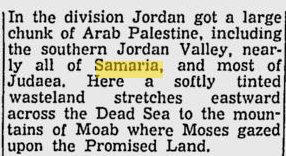According to a report in Israel National News, the commander of Israel Army Radio, the national radio station in Israel operated by the Israel Defense Forces, has determined that all the station’s reporters should refer to the West Bank as “Judea and Samaria.” The report states the decision was made as a result of complaints made by Israel Media Watch that the radio station’s referral to the area as the “West Bank” gives the impression to listeners that the territory does not in fact belong to Israel.
Israel Army Radio is a popular mainstream station in Israel listened to by people from across the political spectrum. It is thus significant that it is now being directed to use the same terminology used by the settler movement when invoking the Biblical, divine notion of “Greater Israel” that is completely detached from reality, diplomacy and human rights.
The author added:
I just chose to point out this news item since it is a good example of the “zeitgeist” in Israel, the slow unraveling of rhetoric that exposes the reality on the ground.I love how these guys believe that "West Bank" is a historic term and "Judea and Samaria" are modern, rightist settler terms, a phrase daring enough to ring alarm bells in their little heads that cannot conceive of a Middle East before the 1970s.
So here's a quick look through the news archives from the 1950s through the 1970s.
From a National Geographic News Bulletin, from 1956:
The Free Lance-Star, 1965:
The term "west bank" was used between 1948 and 1967, almost exclusively without capitalization.
Before there were any settlements, the Labor-led Israeli government called the area "Judea and Samaria" as this 1968 UPI article shows:
Soon, the anti-Israel crowd started to push the use of the term "West Bank" as a proper name. Note that happened after 1967, showing that it wasn't a Jordanian initiative, Here's an example of one of the earliest uses of the term as a proper name from an AP article written in 1971, referring to the "so-called West Bank:"
And that, ladies and gentlemen, is how a lie is created.
So today the use of the correct historical term for the area is considered extremist, and the use of the anomalous term created when Jordan illegally annexed the area for 19 years is considered normative.
(To their credit, most leftist commenters to the article cited noted that there is nothing political about referring to the area as Judea and Samaria. Calling it The West Bank, on the other hand, is purely political - first to make it appear as part of Jordan and later to avoid giving it any Biblical connotation.)

 Elder of Ziyon
Elder of Ziyon







































